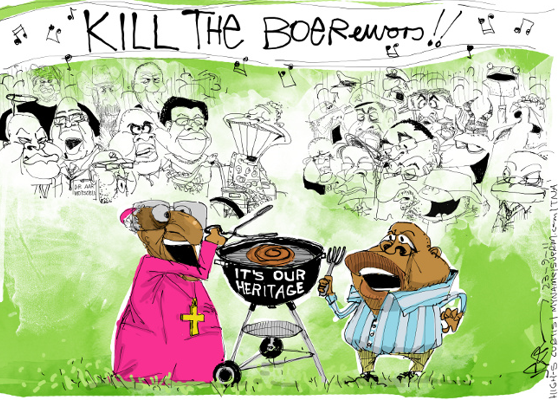
In 2012 Elize Joubert completed a research project on the 'Heritage Day versus Braai Day' debate while completing her Mphil in Conservation at the University of Cape Town. For anyone interested in the origins of Heritage Day, the history of the braai and the arguments on both sides of the debate her report is a must read. We have reprinted the introduction below. For those interested in reading the full report click the download button below the notice.
September. The beginning of spring in South Africa: The air is warmer, somehow thicker. Fresh green leaves on the trees. The smell of Jasmin. And something else....the aroma makes your mouth water. Oh, that familiar smell. Someone is having a ‘braai’! I am sure that smell cannot smell the same, anywhere else in the world. Because it is not only one smell, but the combination of smells. It can only smell like that here. In this country. At this time. Springtime!
September 24, National Heritage Day. People are dedicating songs to it... video satires have been made about it....competitions are held on National TV.... books are being published about it....everybody is preparing for the big event! Politicians are supporting it or condemning it. Columnists are writing about it. Even some funny cartoons... and yet some are getting very hot under the collar about it. Should we or shouldn’t we ‘braai’ on this day? And whose idea was it, anyway?
Through the new Constitution, everyone has the right to freedom of expression, freedom of association and the right to enjoy their own culture. Heritage Day was declared as one of our new Public Holidays, to celebrate our traditions and our diverse cultures. In 2005, a bright ‘spark’, Jan Scannell, aka Jan Braai, wanted to unite the people of South Africa by finding one thing that he thought they all had in common: having a ‘braai’ around the fire. Jan actively marketed the idea, and in 2007 convinced Emeritus Archbishop Desmond Tutu to become the patron of National Braai Day. By having Tutu endorse the project, many people bought into the idea, and like many other public holidays, it has become a commercial event.
Unfortunately, instead of uniting the country, National ‘Braai’ Day, has in fact divided the country into three main sectors: those who support it, those who oppose it, and those who don’t care either way. The main question that I have asked is whether the cultural significance of Heritage Day has been maintained by the introduction of National ‘Braai’ Day as a sub-theme or if the cultural value has been impacted negatively by focussing the attention on the ‘braai’?
Some other questions that were also raised: Is the campaign ‘Braai4Heritage’ appropriate in the post-apartheid democracy? As a divided country, can we find a common heritage that all people can relate to? Does ‘Braai’ Day contribute to nation building? Should we celebrate our differences or our unity on Heritage Day? How can we do both successfully? How does ‘Braai’ Day address gender equality and gender roles in terms of our new constitution? Do we fall back into old traditional patterns on ‘Braai’ Day, such as women-in-the-kitchen and men-next-to-the-fire? Where do the women of South Africa stand in all of this, or are they just happy that the men want to cook? Should we concentrate on our own heritage as members of a specific group on this day or learn about each other’s heritages? Should ‘Braai’ Day rather be re-packaged with the participation of all people and all aspects of cultural significance, where co-existence of cultural values are recognized, respected and encouraged? If National ‘Braai’ Day is a unifying event, shouldn’t it rather occur on the Day of Reconciliation?
Disclaimer: Any views expressed by individuals and organisations are their own and do not in any way represent the views of The Heritage Portal.
